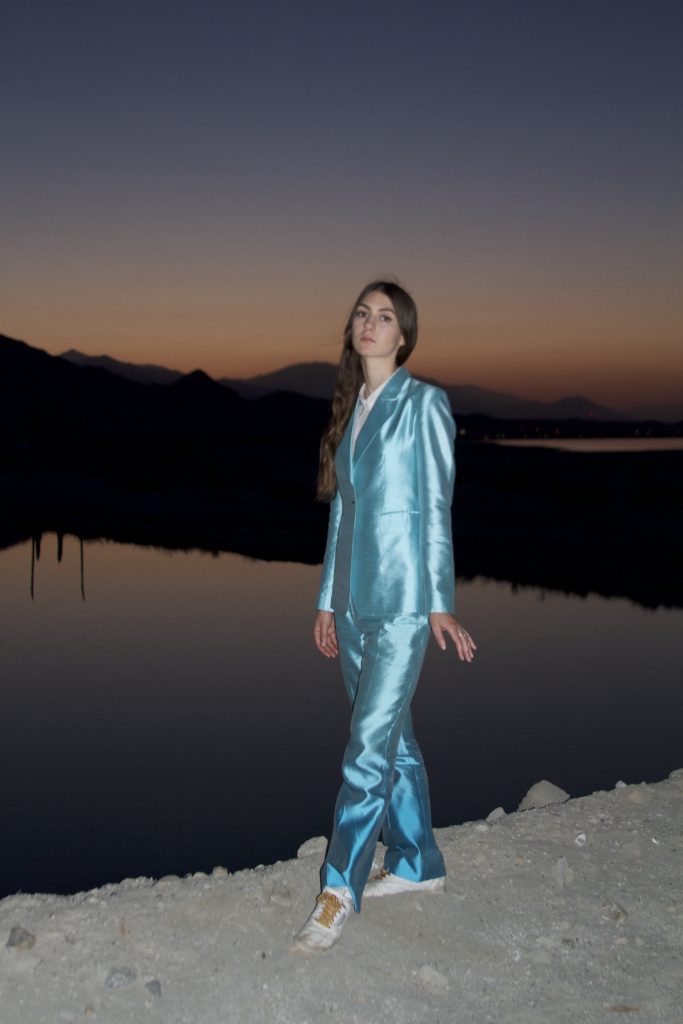The Renaissance Queen talks to Fusion: Weyes Blood
TXT: Isabel Aleman
Natalie Mering (AKA Weyes Blood) is quickly becoming a force in the indie-music scene, with her recent collaboration with Ariel Pink which catapulted her to a bigger audience. People are falling in love with her fluid imagery and her resurrection style; it’s awesome that a musician like Natalie is being recognized to the world for being the genius that she is. Weyes Blood will be preforming at this year’s Marfa Myths along with Perfume Genius.
Fusion- Curious if you could tell us how you came up with Weyes Blood as your name?
Natalie Mering: It comes from a book by Flannery O’Connor called Wise Blood. When I was 15, I just felt like it kind of resonated with me and I decided it had a nice ring to it. I liked the idea of blood being this separate entity that is passed down from generation to generation, which is kind of true. So I just decided it was the best thing for me and it just kind of stuck.
I kind of want to ask you about Mexican Summer, when you joined their family, how has your life changed?
Tremendously. I was afforded the opportunity to tour, which I think has made me a lot better at music. I got to tour for like 9 months out of the year, something crazy, just non-stop touring with great musicians has inspired me on a label for sure. Then, also they set up that festival in Marfa and that’s always a lot of fun, for sure.
What are you most looking forward to about playing Marfa Myths?
I’m dong part solo, part singing with Perfume Genius, and I’m really looking forward to doing that with him. He’s incredibly talented guy. I’m also looking forward to the stars and going on a weird windy desert walk, and the burritos too.
I know you grew up in Pennsylvania, and there was an NPR article I read that said you tried to find your place in a male dominated hard-core scene, but that they told you your feminine voice was soft and you weren’t very welcome. I want to know, as a woman, how did that challenge you to grow?
Well, it made me start to play solo, and made me realize my dream of joining a band and being like Kim Gordon just weren’t going to come true. I guess I have to build this from the ground up by myself. It kind of made me more self-sustained. I think women have to work twice as hard, because there’s not as much support.
What do you think about what’s going on right now, were you at a march in L.A.? (Womens March)
I feel like there is a lot of cronyism with the Trump administration. There’s a lot of handshakes between men and its incredibly sexist. I’m just trying to keep my head above water and not to get too oppressed or immobilized. I think it’s important to stay active, stay alert and continue to pursue whatever you can contribute to the downfall of this administration, because they’re pretty bad.
I kind of want to know how you’ve prepped your voice from record to record, and how each record has been different with your voice, because I think your voice in itself is an instrument.
I think my voice can be pretty raw and I kind of didn’t put any adaptation on it, and then I think after touring when The Innocence came out I really honed my style and learned how to have more control of my voice. It just keeps getting more and more what I can sing in my head, you know? I think singing is a muscle and once you do it every day for a couple of years, you kind of reach a certain level of expression.
On the Mexican Summer Bio page, there was a quote about what Weyes Blood was supposed to mean, it says “Weyes Blood affirms conflict harmonious life, within a disharmonious world”—Sorry if I butchered that, I actually really loved that, maintaining peace in a disharmonious world, could you please elaborate on that?
I think opposites, like every opposite there is a little bit of the opposite with in itself, kinda like the ying and yang has the little tiny black circle with the white portion of the circle, so I think with that in mind I try to make music that is beautiful and serene, but might also include the intensity of something that is kind of violent and sublime. I try to make a marriage between both worlds because I feel that is the human condition and that really is how life is on this planet and I think that dystopian kinda disharmony kind of what’s happening right now, can be serene if you look at it a certain way—it’s all about perspective.
I want to discuss your lyrics. Off of The Innocence, my favorite sonng is definitely “Bad Magic.” The first lyrics are, “Get out of bed, put on some clothes and find your shoes” and then a little further on in the song it says “Things just don’t stay the same and I must find a way to move on”—I really like that in its simplicity and yet how complex the idea is. How do you, Natalie, move on from hard situations?
It takes a lot of time and a lot of effort and a lot of letting myself go through emotions, I’m a very sensitive person so, things kinda hit me really hard and I have to create this space for myself to kind of evolve through that and kind of channel suffering or channel my feelings into a new positive thing. In that case in that instance it was that song, kinda channeling all the stuff that was going on in my life that felt really terrible into a song. That was the last song I recorded, it was kind of a weird last minute edition, done in one take. It has a raw feel, very spontaneous and of the moment.
Lets talk about your collaboration with Ariel Pink, what did you learn from that collaboration and what do you think he learned from working with you?
I think he learned that I could sing. We were trying to get these crazy sounds out of my voice and you could hear it on “ Tears on Fire”— kinda like a big operatic thing that I don’t usually do, that was really fun. And I learned from him that he has this almost lego mentality with harmony where he will take a little harmony that sounds super simple and then build on that and kinda create this masterpiece and I had never seen somebody work that way who could see the final outcome from the very beginning. Every time he’d be like, “I got this idea this is the melody,” and I’d be like, “That’s like whatever.” Then he’d build on it and I’d be like WOW, you heard this end point the whole time and I didn’t even hear that. Kinda like savant style.
Can you please tell the Fusion Magazine readers something that you love about music that nobody really knows about you?
I’ve been really into 90s alternative music lately, like revisiting stuff I’d listen to on the radio as a kid. Suzan Vega especially, she has a song called “Bad Wisdom.” It’s kind of like this weird organ medieval sounding song and its so strange, cause I think I heard it a lot as a kid, and I really loved it. When I was writing “Bad Magic”I didn’t think about that song, when I called myself Weyes Blood I didn’t think about that song. It’s never been in my peripheral vision until recently I rediscovered it and that was kind of a interesting discovery for me. That’s a secret nobody knows about that. FM



